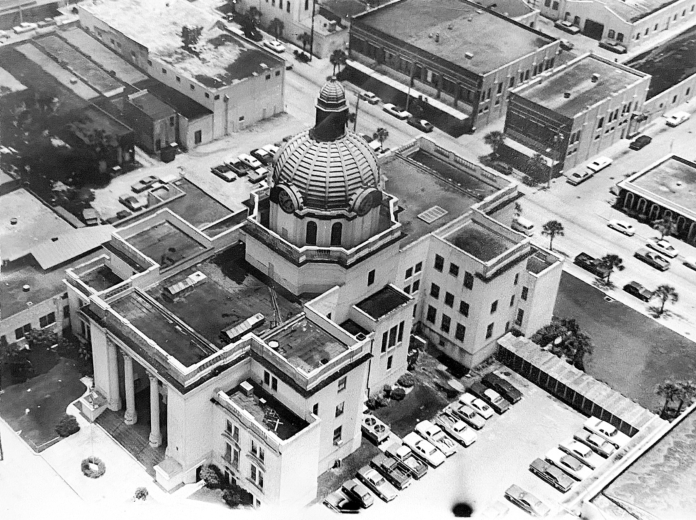
The story of how DeLand got to be the county seat
The older city of Enterprise, which had dominated because of its prominence as a steamboat hub, was the current county seat. However, as rail transport began to eclipse the popularity of steamboat travel, Enterprise’s fortunes were in decline, just at the time when the city of DeLand was growing exponentially.
Nevertheless, Enterprise believed it had historical tradition on its side, and those in the southern part of the county were determined to fight the move for change.
Prize designation
After the town survived the 1886 fire to become more prosperous than ever, DeLand leaders looked around for other ways to continue to advance the fortunes of their community.
The prize designation of “county seat” seemed an ideal means to accomplish their purpose.
Groups of impassioned speakers from both towns traveled the county drawing large crowds at each stop, and incidents of fighting were reported.
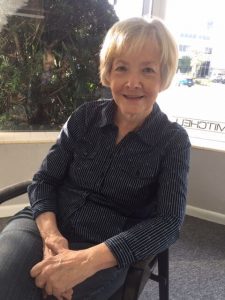
of our feature Better Country Beyond, with excerpts from DeLandite
Karen Ryder’s, pictured, book about the early days of the founding of the city of DeLand.
The Beacon is indebted to Donna Jean Flood, a DeLand financial adviser
with Edward Jones, for the idea for this series, part of our ongoing West Volusia Memories series by community writers.
With feelings running so high, and firearms so common, it isn’t surprising that on at least one occasion, shots were actually fired.
One incident involved Arthur G. Hamlin, who a couple of years later would develop the Hamlin orange up in his Glenwood grove.
Hamlin had arrived in DeLand in 1883 on a steamboat so crowded that he and another man had to share a berth made by placing a mattress on a large table. When another attorney, Isaac Stewart, arrived in town in 1885, he and Hamlin set up the town’s first law partnership.
Their firm represented both Henry A. DeLand and John B. Stetson, as well as the DeLand Town Council, so the two lawyers were quite vocal in their support of relocating the county seat. By being in the forefront of the fight for change, they were logical targets of the pro-Enterprise faction.
Passions came to a head one night when Hamlin returned to his home on Woodland Boulevard after a meeting.
As he drew up to the property, he was accosted by a mob of men who had ridden into town from Enterprise to lay in wait for him. Hamlin made a run for his door, and in the ruckus, he was shot at, but managed to get inside without being injured.
News of the incident spread rapidly through the area and served to feed fears that a large-scale armed conflict was set to erupt.
As it turned out, these fears never materialized and the county-seat war was handled through the legal system.
The City of DeLand made the first move.
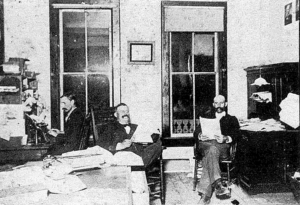
At the regular February 1888 meeting of the Volusia County Board of Commissioners in Enterprise, Isaac Stewart rose to submit a petition for the change that was signed by 825 registered voters, a number that represented more than one-third of the total registered voters of the county.
Stewart then moved that an election be held to decide the issue, but the Board of Commissioners at this point was not enthusiastic about the idea and let the motion die for lack of a second.
Determined to try again, Stewart got a Circuit Court judge to call an extra session, just one week after the previous one, for the sole purpose of acting on the petition. This time, when the motion for an election was made, it was seconded and passed.
An election date of March 29, 1888, was set. Citizens of each city in Volusia County would vote for the county seat of their choice.
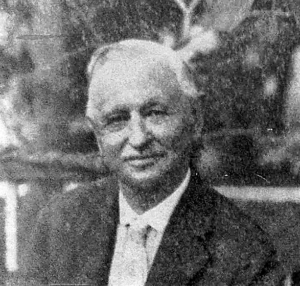
DeLand’s celebration gets out of hand
Putting the matter up for a countywide vote effectively ended the contest.
For the less-populous town of Enterprise, it was all over but the counting. The final tally was 1,003 votes for DeLand, more than double the 439 votes cast for Enterprise. Other municipalities received lesser numbers.
When the official count was reported, the citizens of DeLand held a celebration that Helen DeLand said was the greatest the town had ever seen.
At the peak of the festivities, a crowd of 2,000 to 3,000 people filled the streets. Several townsmen were convinced that “In order to fittingly rejoice, noise was necessary.”
They set one anvil on top of another in the middle of Woodland Boulevard, and filled the space between them with gunpowder. When the charge was set, the resulting noise certainly was earsplitting, and a rousing cheer erupted from the crowd.
Unfortunately, however, one man who had been standing too close to the makeshift contraption was permanently crippled in the explosion.
On April 3, 1888, the city of DeLand was officially declared to be the county seat, but the city of Enterprise, the once-great boomtown on the St. Johns River that had held the county seat designation since the county’s inception, made one last quixotic attempt to keep its relatively new courthouse building as the locus of county government.
Enterprise officials petitioned the Supreme Court of Florida to restrain county commissioners from removing the county records to DeLand.
However, the voters had spoken.
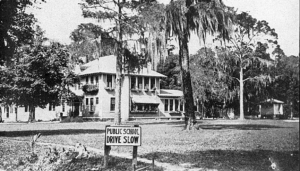
Three courthouses
The new DeLand building in this story was actually the county’s third courthouse.
The county operations in Enterprise had moved out of their original location in a wood-frame structure into a second one of stone construction.
This second courthouse had been in use only for a few years when the county seat was moved to DeLand, but the sturdy building was put into good use as a public elementary school for the children of Enterprise.
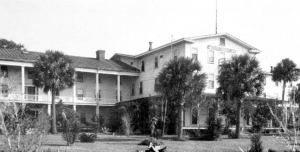
NAME DIDN’T STICK — The Brock House in Enterprise, shown above, was renamed Benson Springs Inn in about 1924, the same year the city of Enterprise was renamed Benson Springs. The Brock House, long patronized by those who arrived in West Volusia via steamboats that came up the St. Johns River, had about 100 rooms. It was demolished in 1936. As for Benson Springs, 10 years after the renaming, the original name of Enterprise was restored. To this day, author Karen Ryder notes, “the people of this little hamlet are still fighting to preserve their proud heritage and to avoid being swallowed up by the much-larger neighboring cities of Deltona and DeBary.”
The high court dismissed the case, and ordered that a county judge be present to supervise the commissioners while the records were removed to DeLand.
The favorable outcome for the city of DeLand was undoubtedly enhanced by two factors. Henry DeLand had promised that he would donate a parcel of land to be used as the site for the courthouse, and he, as well as John B. Stetson and Mayor Fred S. Goodrich, pledged a $15,000 bond to the Board of Commissioners, the acceptance of which would commit the commissioners to the construction of a new courthouse in DeLand on the donated property.
In addition, the three men promised that the changeover would be expedited promptly, with the new building being operational within the city of DeLand in no more than a year’s time.
Once the legalities were satisfied, an imposing, multistoried, red-brick structure immediately began to rise on the donated site.
When the deed for the City of DeLand’s courthouse property was officially recorded, it contained a significant “reverter clause” — if county offices were ever moved from that site, the land would automatically be returned to Henry DeLand or his heirs.
Clearly, the city’s founder was still maneuvering the outcomes with an eye toward any future attempt to undo what had been achieved for the city.
However, the winners and the losers in this struggle for power eventually moved on to other issues, and the construction of the new courthouse in DeLand progressed to its completion in 1889 and, from then until the present day, county offices have occupied the site of DeLand’s first courthouse.
— Ryder and her husband, Bob Wetton, live in DeLand and are active members of the West Volusia Historical Society. For information about obtaining a copy of her book Better Country Beyond, call the Historical Society at 386-740-6813, or email delandhouse@msn.com.